|
Progressive Men of Iowa
1899
Progressive Men
Index
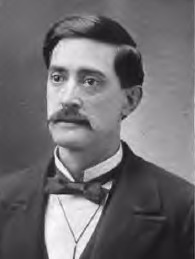 COVER, O. Alvin, M. D., of Seymour, was born
in Union county, 111., Feb. 22,1862. His father,
Abram Cover, was of German descent and a man of firm
character and fixed habits, being recognized for his
sterling worth and ability in the community where he
resided. He was a soldier In the Mexican war and when
the war of the rebellion broke out enlisted in the Sixth
Illinois cavalry, and served his country faithfully as
lieutenant of his company until receiving his discharge
on account of ill health. He died at his old home in
1892. He was engaged in the milling and mercantile
business and was a man of some means. At the time of
his death and for several years previous, he was a
licensed exhorter in the Methodist church, and was
always found at his poet of duty in religious work. He
was married to Sophia Miller. She was a woman of more
than ordinary intelligence and ability, and a shining
light in the church. She possessed all the qualities of
a devoted wife and a kind and loving mother. Nine
children were born to them, five boys and four girls, of
whom four boys and three girls are living, all residents
of Illinois except the subject of this sketch, who is
the youngest of the boys. COVER, O. Alvin, M. D., of Seymour, was born
in Union county, 111., Feb. 22,1862. His father,
Abram Cover, was of German descent and a man of firm
character and fixed habits, being recognized for his
sterling worth and ability in the community where he
resided. He was a soldier In the Mexican war and when
the war of the rebellion broke out enlisted in the Sixth
Illinois cavalry, and served his country faithfully as
lieutenant of his company until receiving his discharge
on account of ill health. He died at his old home in
1892. He was engaged in the milling and mercantile
business and was a man of some means. At the time of
his death and for several years previous, he was a
licensed exhorter in the Methodist church, and was
always found at his poet of duty in religious work. He
was married to Sophia Miller. She was a woman of more
than ordinary intelligence and ability, and a shining
light in the church. She possessed all the qualities of
a devoted wife and a kind and loving mother. Nine
children were born to them, five boys and four girls, of
whom four boys and three girls are living, all residents
of Illinois except the subject of this sketch, who is
the youngest of the boys.
Dr. Cover received a good
common school education at home, and then attended the
Frankfort, 111., high school, after which he went to the
Southern Illinois Normal school. After completing his
education he taught school for a period of ten years.
His record in the class room and as principal of the
Alto Pass high school, gave him a place among the
educational leaders of southern Illinois. But he was not
satisfied with this. From the age of 18 years his one
great desire was to become a physician. To this laudable
ambition every energy was bent, and after a long and
studious course he now occupies a high place in his
profession. In the year 1891 he entered the college of
physicians and surgeons in Keokuk, and at the end of one
year went to Centerville, and associated himself with
Prof. Robert Stephenson, remaining with him until the
death of the latter. He then went into the office of Dr.
J. L. Sawyers, where he remained five months. He then
attended the Baltimore Medical college at Baltimore,
Md., where he received the degree of M. D. in March,
1893. He was again professionally connected with Dr.
Sawyers for a period of eight months of active practice;
still not being satisfied and desiring further
preparation for his life-work, he entered the Jefferson
Medical college at Philadelphia, Pa., and received a
second diploma in May, 1894.
The next month he located in
Seymour, Iowa, where he has since remained, enjoying a
large and constantly increasing practice. He has a
first-class professional standing in the county and
state and holds the respect and good will of his
co-workers in the cause of relieving suffering humanity,
according to the allo-pathic school of medicine. Dr.
Cover has many warm personal friends and is a favorite
in social circles. He is a prominent Odd Fellow, having
passed through all the chairs; is a master Mason and a
member of the Modern Woodmen of America. He is the
medical examiner for the New York Life Insurance
company, Bankers' Life association, the Modern Woodmen
and the New York Mutual Life insurance The doctor has
always been an enthusiastic republican, and during his
residence in Illinois participated in several hotly
contested campaigns, and served as chair-man of the
township committee. He was several times a delegate to
congressional and senatorial conventions. The one great
aim of his life is to excel in his profession. Hard study and
close application have already brought him up to the
high rank enjoyed by many of mature years. He is a
member of the Des Moines Valley Medical
association.
Dr. Cover was married December 28,
1898, to Miss Jessie Llewellyn, of Seymour,
Iowa.
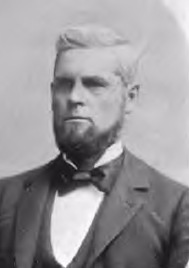 HART, Edward Lorenzo, one of the foremost
attorneys of Corydon, was born near the village of
Hadley, Lapeer county, Mich., December 3, 1850. He is of
English descent on the paternal side, the early
ancestors having come to America at a very remote day
and settled at or near Hartford, Conn. Members of the
family later removed to Rochester, N. Y., from whence
William Hart, the grandfather of this subject, moved
with his family to Hadley, Mich. The Harts, as far back
as they can be traced, were farmers and mechanics. Ansel Hart, the
father of E. L. Hart, settled near the village of
Cambria, Wayne county, Iowa, in 1856, where he was
postmaster for several years. He died there in 1877. His
wife and the mother of Edward L. was Clementina Russell,
a member of one of the pioneer families of Ionia county,
Mich. HART, Edward Lorenzo, one of the foremost
attorneys of Corydon, was born near the village of
Hadley, Lapeer county, Mich., December 3, 1850. He is of
English descent on the paternal side, the early
ancestors having come to America at a very remote day
and settled at or near Hartford, Conn. Members of the
family later removed to Rochester, N. Y., from whence
William Hart, the grandfather of this subject, moved
with his family to Hadley, Mich. The Harts, as far back
as they can be traced, were farmers and mechanics. Ansel Hart, the
father of E. L. Hart, settled near the village of
Cambria, Wayne county, Iowa, in 1856, where he was
postmaster for several years. He died there in 1877. His
wife and the mother of Edward L. was Clementina Russell,
a member of one of the pioneer families of Ionia county,
Mich.
E. L. Hart attended the
common schools of Wayne county about six months in the
year from 1856 to 1862, and became proficient In the
studies taught in that early time. He was notably good
in orthography, and earned considerable notoriety by 11
spelling down
all comers at the spelling schools, then very
common in the neighborhood. No schools were taught
during the two years following the outbreak of the war
and it was decided that he should return to Michigan in
order that he might have school advantages. Accordingly,
on his fourteenth birthday, he started on foot to
Ottumwa, then the terminus of the Chicago, Burlington
& Quincy railroad and sixty miles distant, from
which point he took the train for his native state. Arriving there
he at once entered school, remaining until 1866, at
which time he returned to his home in Wayne county,
making the journey from Ottumwa on foot. At Cambria the
following winter he attended a school which was taught
by Theodore Laing, now a prominent lawyer in Concordia,
Kan., whose interest in the boy did much to encourage
him to further pursue his studies. The fall of 1867
found him in the schools of Garden Grove under the
tutorage of Prof. R. A. Harkness, now of Parsons
college. Here he remained for four years, excepting the
time required to earn money with which to pay his
expenses, by teaching. He was but 17
years of age when he began teaching, and that avocation
was followed for six years. The last school
taught by him was at Corydon. In 1872 he spent six
months as clerk and bookkeeper in a dry goods store, and
again in 1876 about the same length of time as clerk in
a drug store. It was late in 1876 when he took up the
study of law by devoting a portion of each day to
reading standard law books borrowed from J. B. Evans,
now of Princeton, Mo., who later became his
preceptor.
After having been admitted to the bar in 1877 he
opened an office in the town of Allerton, in his home
county. In 1878 he formed a partnership with George
Albertaon, and the same was continued until 1881, when
he purchased the interest of that gentleman and
continued alone till 1891, at which time he removed to
Corydon. The following May a business relation in
practice was established with R. C. Poston, and the same
is still existing.
When Mr. Hart first came to Wayne county, away
back in 1856, the country was new, very new, and but few
farm residences broke the monotony of the wide,
trackless prairies. His father purchased 240 acres of
land at that time, which was during the following years
fenced with rails hauled from a point five miles
distant.
Helping with this and driving four yoke of oxen
to a breaking plow furnished the amusement to while away
the spare hours of Mr. Hart's
youth.
He was reared a republican, and
voted with that party until reaching his twenty-sixth
year, when, after a careful study of political economy,
he was led to repudiate the doctrine of protection and
became a radical free trader. However, he has always
advocated measures and policies rather than parties. He
has taken a more or less active part in the campaigns of
his county for the last twenty years. He was married to
Miss Ida Matson September 8, 1873. She is a daughter of
Thomas A.
Matson, formerly of Chariton. They have six
children-Edward L., Jesse B., David R., George A., Mary
and Charles A.
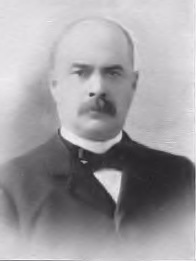 MILES, Hon. Lewis, of
Corydon, who served several terms in the legislature and
has been twice appointed United States district
attorney, was born in Marion county, Ohio, June 30,
1845. He came to Wayne county with his parents in April,
1853, and has resided there constantly since. His
father, William Miles, was a farmer. He died December
26, 1879. His mother, Emily Welch Miles, died October
11, 1865, Lewis Miles worked on a farm until 19 years of
age, when he commenced the study of law in the office of
Gen. S. L.
Glasgow. He was admitted to the bar at Corydon,
in October, 1868, and commenced active practice in
November, 1872, at which time a partnership was formed
with Capt.
J. N. McClanahan. In October, 1869, when but a
few months past 24, he was elected to the state
legislature, and despite his youth, was recognized as
one of the most influential members of the lower house.
In June, 1873, the relation with Captain McClanahan was
dissolved, and another formed with W. H. Tedford, now
a judge in the Third judicial district, under the firm
name of Tedford & Miles, which continued until
February, 1879. His next law associate was J. W. Freeland and the
firm of Freeland & Miles enjoyed a prosperous
business until 1891, when it was dissolved. Mr. Miles
practiced alone until August 1,1894, when he became
associated with C. W. Steele, under the firm name of
Miles & Steele, which still
continues. MILES, Hon. Lewis, of
Corydon, who served several terms in the legislature and
has been twice appointed United States district
attorney, was born in Marion county, Ohio, June 30,
1845. He came to Wayne county with his parents in April,
1853, and has resided there constantly since. His
father, William Miles, was a farmer. He died December
26, 1879. His mother, Emily Welch Miles, died October
11, 1865, Lewis Miles worked on a farm until 19 years of
age, when he commenced the study of law in the office of
Gen. S. L.
Glasgow. He was admitted to the bar at Corydon,
in October, 1868, and commenced active practice in
November, 1872, at which time a partnership was formed
with Capt.
J. N. McClanahan. In October, 1869, when but a
few months past 24, he was elected to the state
legislature, and despite his youth, was recognized as
one of the most influential members of the lower house.
In June, 1873, the relation with Captain McClanahan was
dissolved, and another formed with W. H. Tedford, now
a judge in the Third judicial district, under the firm
name of Tedford & Miles, which continued until
February, 1879. His next law associate was J. W. Freeland and the
firm of Freeland & Miles enjoyed a prosperous
business until 1891, when it was dissolved. Mr. Miles
practiced alone until August 1,1894, when he became
associated with C. W. Steele, under the firm name of
Miles & Steele, which still
continues.
Mr. Miles was married
February 20, 1868, to Miss Mary D. Robb, at Corydon.
They have an interesting family of four children;
William E., born March 9, 1871; Charles B., born
February 4, 1874; Winifred, born March 9, 1876, and
Lois, born August 5, 1882.
In 1879 he was a candidate on
the republican ticket for the state senate, and was
defeated, although running far ahead of ticket. In 1880
he was presidential elector for the Eighth district and
voted for Garfield and Arthur. He was the choice of bis
party for member of the upper branch of the general
assembly again in 1883, and was elected by a good
majority, serving in the Twentieth and Twenty-first
General Assemblies. President Harrison appointed him to
the position of United States district attorney for the
southern district of Iowa, and during his incumbency of
that office, extending over a period of four years, not
a single indictment drawn by him or in his office was
quashed or declared insufficient. His record as an officer and his distinguished
party services secured his reappointment to the district
attorney ship when the republicans returned to power in
1896, the Iowa delegation being united in recommending
him for the place. He takes an active part in politics,
and is in demand as a speaker during every campaign. He
made thirty-seven speeches in the McKinley-Bryan
campaign. He has been engaged in the active practice of
law since 1872, except when broken by his appointment to
the United States attorney ship, and has a law library
of over 3,000 volumes. He is regarded by the bar of the
state and by the leading politicians of all parties as
one of the brightest and ablest men in the
state.
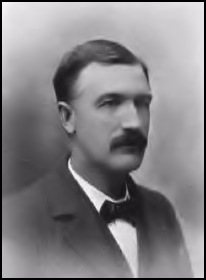 ROBERTSON, Nathan Anda, a prominent banker
and businessman of Promise City, Iowa, and one whose
name justly belongs among the progressive men of Iowa,
was born on a farm one mile west of Cincinnati, Iowa, in
1855. His father was Moses C. Robertson, a farmer in
comfortable circumstances, who emigrated to Iowa, from
Indiana, in 1851, and settled in Appanoose county, near
Cincinnati, entering 600 acres of government land, which
still belongs in the family. His mother's maiden name
was Streepey, and her father, Edward Streepey, also came
to Iowa from Indiana, in 1850, and located in Appanoose
county. ROBERTSON, Nathan Anda, a prominent banker
and businessman of Promise City, Iowa, and one whose
name justly belongs among the progressive men of Iowa,
was born on a farm one mile west of Cincinnati, Iowa, in
1855. His father was Moses C. Robertson, a farmer in
comfortable circumstances, who emigrated to Iowa, from
Indiana, in 1851, and settled in Appanoose county, near
Cincinnati, entering 600 acres of government land, which
still belongs in the family. His mother's maiden name
was Streepey, and her father, Edward Streepey, also came
to Iowa from Indiana, in 1850, and located in Appanoose
county.
At this time Iowa was one
vast prairie, only dotted here and there with a few log
cabins. Mr.
Robertson's education was received in the
district school and in the Cincinnati high school. At
the age of 19 he, like a great many other boys, got the
gold fever and started west to make his fortune, landing
in Colorado and Nevada among the mines; but he found
that a boy or man with small means stood no better show
there than elsewhere. He managed, however, to pick up a
few dollars, and after one year came back home and
concluded that Iowa was good enough for any one with
good hands and brains, who was willing to use them. By this time the
railroad had reached Cincinnati and Mr. Robertson began
buying and shipping stock and grain, following this
business for two years until the M., I. & N.
railroad pushed on west from Centerville. He then
believed Wayne county to be one of the best grain and
stock counties in the state and began to cast about for
a new location and decided upon Promise City, locating
there in August, 1879, a few days ahead of the railroad.
Time proved that his judgment was good. There was plenty
of grain and stock to handle and he located buyers at
all of the stations west on this road to Humeston, and
by careful management succeeded in accumulating
considerable money. In 1885 the business of the town had
so grown that he concluded to open a small bank as an
experiment, scarcely expecting that it would pay. He
opened it as the Exchange Bank of Promise City, with a
capital of $15,000. This he soon found unable to do the
business and the capital was increased to $25,000, and
later in 1895 the bank was reorganized and incorporated
as the Farmers State Bank of Promise City, with a
capital of $25,000 and a surplus of
$10,000.
In 1892 Cincinnati, his old
home, had grown so that he concluded it would be a good
place for a bank, and accordingly in July, 1893, he
opened the Farmers and Merchants bank at that place,
with himself as president and J. V. Leseney as cashier,
with a paid-up capital of $25,000. The secret of
his success has been in his push and energy and in
unhesitatingly taking advantage of the opportunities
that presented themselves to
him.
In politics he has always been a
republican. He was married in 1875 to Emma Leseney at
Cincinnati, Iowa. To them have been born nine children:
Raleigh L., Guy C., James Blaine, Nathan Ray, Rex Wayne,
Cecil M., Lela J., Addie Mabel and Pansy
Independence.
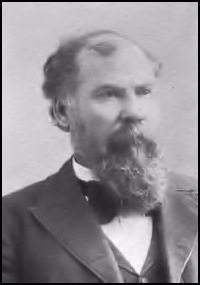 TEDFORD, Judge William Hamill, who at this
writing holds a judgeship in the Third judicial district
of Iowa, was born in Blount county, east Tennessee,
November 8, 1844. He is the son of John and Elizabeth
Hamill Tedford, who were of English and Scotch and
Scotch descent, respectively. Both
great-grandfathers fought on the side of the patriots in
the revolutionary war. It was during that struggle that
John Tedford and Mary Paxton, the great-grandfather and
great-grandmother of Judge Tedford, were married in
Rockbridge county, Va. Mary Paxton belonged to that
celebrated family of Virginia Paxtons from which sprung
Gen. Samuel Houston, of Texas, and other historic
characters in the ministry and the profession of law.
The grandfather of Judge Tedford was a cousin of General
Houston, their mothers being Paxtons. This grand parent
served in the war of 1812, under General Jackson, with
the rank of captain. After the close
of hostilities he removed to east Tennessee, where the
judge was born. TEDFORD, Judge William Hamill, who at this
writing holds a judgeship in the Third judicial district
of Iowa, was born in Blount county, east Tennessee,
November 8, 1844. He is the son of John and Elizabeth
Hamill Tedford, who were of English and Scotch and
Scotch descent, respectively. Both
great-grandfathers fought on the side of the patriots in
the revolutionary war. It was during that struggle that
John Tedford and Mary Paxton, the great-grandfather and
great-grandmother of Judge Tedford, were married in
Rockbridge county, Va. Mary Paxton belonged to that
celebrated family of Virginia Paxtons from which sprung
Gen. Samuel Houston, of Texas, and other historic
characters in the ministry and the profession of law.
The grandfather of Judge Tedford was a cousin of General
Houston, their mothers being Paxtons. This grand parent
served in the war of 1812, under General Jackson, with
the rank of captain. After the close
of hostilities he removed to east Tennessee, where the
judge was born.
The family came to Iowa in 1851, and located on a
farm, where the education of the young man was secured,
the same being such as was afforded by the common
schools of that day. At the age of 16 he enlisted in
Company F, Eleventh Iowa infantry, and served his
country four years, taking part in the battles of
Shiloh, Corinth, Vicksburg and Atlanta. He participated
in many skirmishes which cannot properly be called
battles, although marked by stubborn fighting and
considerable loss of life, and was with Sherman on his
march to the sea.
When peace had been declared he returned to Iowa,
and entered the State university, graduating from the
law department thereof at the end of two years with the
degree of LL. B. This was in 1869, and in September of
the same year he settled at Corydon, Iowa, and commenced
the practice of his profession. Within a few years he
built up an extensive practice, and had a part in nearly
all the important litigation in the county. The firm of
Tedford & Miles, of which this subject was a member,
in the case of the State of Iowa vs. Kabrich, 39th Iowa,
page 277, first took the position in our supreme court
that the character of one charged with an offense is not
in issue, unless he introduces evidence relative
thereto. This point was sustained by the supreme court,
making this a leading case.
The judge has always been a republican and was
one of the presidential electors for Iowa in 1884. He
was elected one of the judges of the Third judicial
district in 1890, and with Judge Towner, his associate,
was unanimously re-nominated in 1894. The democratic
party in the district ratified the nomination, and their
names were placed on both tickets, so that the election
was in fact almost unanimous. They were both again
re-elected in 1898. He is very active in the work of his
party, and has been called upon to address the people in
different parts of the state on many occasions of
importance. As an interpreter of the law he has few
equals, and his record in the supreme court is
remarkable. In the six years that he has held a seat on
the bench he has been affirmed in almost every
case.
He is a member of the celebrated Crocker Brigade
association, and delivered the biennial address at the
reunion of that organization at Ottumwa, September 26,
1894, of which address it was said by the Ottumwa
Courier: "It was a scholarly and masterful effort. It is
unhesitatingly pronounced the finest address ever heard
at a Crocker Brigade reunion."
The judge is not a member of any church, although
reared a Presbyterian. He was married to Miss Emma
Thomas, daughter of Capt. W. W. Thomas, of
Corydon, June 22, 1875, to which union there has been
born one child, a daughter. She is named Eva, born July
9, 1877. The mother and daughter affiliate with the
Methodist denomination. Judge Tedford
has one of the handsomest homes in Corydon, and is in
good financial circumstances. He is a director in the
Wayne County State bank, and a figure in the business as
well as legal circles of that section of the
state.
The information on Trails to
the Past © Copyright may
be used in personal family history research,
with source citation. The pages in entirety may
not be duplicated for publication in any fashion
without the permission of the owner. Commercial
use of any material on this site is not
permitted. Please respect the wishes of
those who have contributed their time and
efforts to make this free site possible.~Thank
you! |